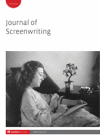
Journal of Screenwriting
Scope & Guideline
Navigating the Evolving Landscape of Screenwriting
Introduction
Aims and Scopes
- Interdisciplinary Screenwriting Studies:
The journal emphasizes a mix of creative and academic approaches, encouraging contributions that merge theory with practice in screenwriting. - Cultural and Contextual Analysis:
Papers often explore the relationship between screenwriting and cultural narratives, examining how scripts reflect and shape societal values and issues. - Inclusivity and Diversity in Storytelling:
There is a significant focus on gender, race, and class representations in screenplays, highlighting the importance of diverse voices in the screenwriting process. - Innovative Narrative Techniques:
The journal addresses contemporary narrative forms, including interactive and virtual reality storytelling, expanding the understanding of what constitutes screenwriting. - Historical Perspectives:
Articles frequently delve into the historical evolution of screenwriting practices, offering insights into the development of genres and styles over time.
Trending and Emerging
- Postcolonial and Transnational Narratives:
There is a growing interest in exploring screenwriting through postcolonial and transnational lenses, examining how global narratives are constructed and received. - Gender and Queerness in Screenwriting:
A significant trend is the exploration of gender dynamics and queer representation in scripts, reflecting broader societal movements for inclusivity and equality. - Interactive and Virtual Reality Storytelling:
Emerging themes include the development of narrative frameworks for interactive and VR experiences, highlighting the evolving landscape of digital storytelling. - Collaboration and Collective Writing Practices:
Research is increasingly focusing on collaborative screenwriting processes, investigating how teamwork influences narrative development and screenwriting outcomes. - Emotional and Psychological Depth in Character Development:
There is a trend towards analyzing the emotional and psychological aspects of characters, emphasizing the importance of character arcs and internal motivations in storytelling.
Declining or Waning
- Traditional Screenwriting Forms:
There appears to be a reduced emphasis on conventional screenplay structures, as newer forms and experimental narratives gain traction in academic discussions. - Focus on Mainstream Hollywood Narratives:
Research centered exclusively on Hollywood scripts is becoming less prevalent, with more attention directed towards global cinema and independent filmmaking. - Historical Figures and Classic Texts:
While historical analyses remain important, there is a noticeable decline in papers that focus solely on classical screenwriters or historical texts, as contemporary issues take precedence. - Linear Storytelling:
The exploration of linear narrative structures is waning, with increasing interest in non-linear and fragmented storytelling techniques overshadowing traditional formats. - Prescriptive Writing Techniques:
The journal is moving away from prescriptive approaches to screenwriting, such as formulaic guidelines, in favor of more exploratory and theoretical discussions.
Similar Journals

Fourth Genre-Explorations in Nonfiction
Advancing the Craft of Creative NonfictionFourth Genre: Explorations in Nonfiction is a distinguished scholarly journal published by Michigan State University Press, dedicated to advancing the field of nonfiction literature. With its ISSN 1522-3868 and E-ISSN 1544-1733, this journal aims to foster innovative discourse and critical engagement with the diverse modalities of nonfiction writing. As part of its mission, Fourth Genre emphasizes the exploration of creative nonfiction as an art form and a medium for cultural expression, serving as a vital platform for both established and emerging voices in literary nonfiction. Despite its current categorization in Q4 in Literature and Literary Theory, the journal strives to elevate its impact and reach, creating a space for rigorous scholarship and creative practice. Researchers, professionals, and students interested in the intricate relationships between narrative form, factual content, and literary artistry will find this journal indispensable for their academic and creative pursuits. From its inception in 2010 to its convergence period extending to 2024, Fourth Genre continues to play a pivotal role in shaping discussions around the art of nonfiction storytelling.
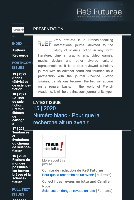
ReS Futurae-Revue d Etudes sur la Science-Fiction
Illuminating the Threads of Science Fiction and SocietyReS Futurae-Revue d Etudes sur la Science-Fiction is a pioneering open-access journal published by UNIV LIMOGES, dedicated to the critical analysis and exploration of science fiction literature and its cultural implications. Established in 2012, this journal aims to serve as a platform for researchers, scholars, and enthusiasts from diverse backgrounds to engage with the multifaceted world of science fiction, encompassing its historical narratives, thematic developments, and societal reflections. With its ISSN 2264-6949, and an unwavering commitment to accessibility, ReS Futurae invites contributions that push the boundaries of traditional discourse in science fiction studies, making it an essential resource for those keen to understand the genre's impact on contemporary thought. By fostering a rich dialogue on speculative futures, the journal contributes significantly to the academic landscape and supports the ongoing investigation of how science fiction shapes societal paradigms.
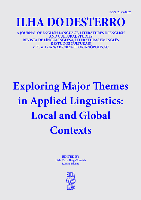
Ilha do Desterro-A Journal of English Language Literatures in English and Cultural Studies
Bridging Disciplines in Cultural Studies and LiteratureIlha do Desterro: A Journal of English Language Literatures in English and Cultural Studies, published by the Universidade Federal de Santa Catarina, is a prestigious open-access journal that has been contributing to the fields of literature and cultural studies since 1979. With an ISSN of 0101-4846 and E-ISSN 2175-8026, it has solidified its role as a significant platform for scholars seeking to explore the intricate relationship between English literatures and cultural phenomena. Recognized in the Q2 quartile for Literature and Literary Theory and ranked 370 out of 1106 in the Scopus index (66th percentile), Ilha do Desterro fosters an inclusive environment for research and dialogue, encouraging contributions that examine diverse literary landscapes through various critical lenses. With its commitment to open access, the journal ensures that the findings and discussions within are readily available to researchers, professionals, and students worldwide, enriching the academic discourse in English studies and beyond.

Cinemas d Amerique Latine
Engaging with the Dynamic Visual Storytelling of Latin AmericaCinemas d Amerique Latine is a pivotal academic journal dedicated to the exploration and critical analysis of Latin American cinema. Published by PRESSES UNIV MIDI-PUM in France, this journal serves as an essential platform for scholars, practitioners, and students to engage with the diverse and dynamic landscape of visual storytelling throughout Latin America. With a dedicated focus on the cultural, historical, and aesthetic dimensions of film in this region, Cinemas d Amerique Latine aims to foster a deeper understanding of the cinematic narratives that shape and reflect Latin American societies. The journal has garnered a respectable Q3 ranking in the Visual Arts and Performing Arts category according to the latest 2023 evaluations, signifying its growing impact and relevance in the field. Despite its current lack of open access options, contributors can expect a rigorous peer-review process, ensuring the publication of high-quality research. Researchers exploring the rich tapestry of Latin American cinema will find Cinemas d Amerique Latine to be an invaluable resource in advancing their studies and contributing to vital scholarly conversations.
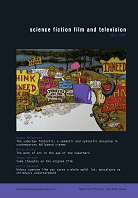
Science Fiction Film and Television
Innovative Perspectives on the Science Fiction GenreScience Fiction Film and Television, published by LIVERPOOL UNIV PRESS, is a leading academic journal that explores the rich intersection of science fiction with cinematic and television narratives. With an ISSN of 1754-3770 and E-ISSN 1754-3789, this journal provides a platform for critically engaging with both historical and contemporary works within the genre, offering insights into its cultural significance, aesthetic innovations, and societal impacts. As part of the communication and visual arts fields, it is recognized in the Scopus ranking, achieving an impressive percentile of 87th in Visual Arts and Performing Arts, and maintaining a respectable rank within communication studies. Since its inception in 2018, it aims to foster dialogues among scholars, professionals, and students, making substantial contributions to the understanding of science fiction as a vital cultural phenomenon. With access options that cater to a broad audience, Science Fiction Film and Television is essential reading for those interested in exploring the innovative potentials and narratives of science fiction across media.
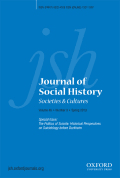
JOURNAL OF SOCIAL HISTORY
Advancing Understanding of Historical DynamicsJOURNAL OF SOCIAL HISTORY, published by Oxford University Press Inc, is a leading academic journal dedicated to the interdisciplinary exploration of social history, examining the complex interactions between society, culture, and politics from historical perspectives. With an ISSN of 0022-4529 and E-ISSN 1527-1897, this esteemed journal has been contributing to the field since its inception in 1967 and continues to serve as a valuable resource through 2024. Recognized for its scholarly excellence, the journal ranks in Q2 for History and Q3 for Sociology and Political Science, highlighting its significance in both fields. Researchers, professionals, and students alike can benefit from its rich array of articles that delve into societal transformations and their historical contexts. Although it is not an open-access journal, its rigorous peer-review process ensures the publication of high-quality work that shapes current academic discourse. With a notable presence in Scopus rankings, including being placed in the 91st percentile for History, the JOURNAL OF SOCIAL HISTORY remains an essential platform for advancing knowledge and understanding of social dynamics throughout history.

BIBLISCHE ZEITSCHRIFT
Engaging with the Richness of Biblical TextsBIBLISCHE ZEITSCHRIFT, published by BRILL, is a distinguished academic journal specializing in the field of Religious Studies. With its ISSN and E-ISSN both registered as 0006-2014, this journal plays a crucial role in disseminating scholarly research related to biblical studies and theology. The journal holds a respectable impact factor, categorized in the Q3 quartile of the 2023 rankings, reflecting its contribution to the academic dialogue within the discipline. Despite being a subscription-based journal, it aims to provide a comprehensive forum for researchers, professionals, and students to engage with in-depth analyses and discussions. Since its convergence in research years from 2002 to 2015 and from 2017 to 2024, BIBLISCHE ZEITSCHRIFT has become a vital resource for those interested in the intricate questions of biblical interpretation and their implications on contemporary religious thought. With its headquarters in Leiden, Netherlands, interested readers can access a wealth of scholarly articles and critical insights that contribute significantly to the ongoing exploration of religious texts and contexts.
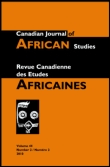
CANADIAN JOURNAL OF AFRICAN STUDIES
Unveiling the Depths of African Cultures and Political LandscapesThe Canadian Journal of African Studies is a premier scholarly publication dedicated to the exploration and critical analysis of African cultures, societies, and histories. Founded in 1976 and published by Routledge Journals, Taylor & Francis Ltd, this journal serves as a vital platform for researchers, educators, and practitioners in various fields, including Anthropology, Cultural Studies, History, and Political Science. With its notable Scopus rankings, including a 96th percentile in History and a 89th percentile in Cultural Studies, the journal exemplifies academic excellence and influence within the social sciences. Although the journal does not currently offer open access options, it remains committed to providing high-quality research articles that contribute to the understanding of African issues in a global context. By addressing pressing social and political challenges, the Canadian Journal of African Studies not only serves academic interests but also fosters a deeper appreciation of Africa's diverse experiences and perspectives.

Con A de Animacion
Catalyzing Discourse in Visual ArtsCon A de Animacion, published by UNIV POLITECNICA VALENCIA, EDITORIAL UPV, is a leading open access journal dedicated to the study and promotion of visual arts and performing arts. Since its inception in 2011, this esteemed journal has established itself as a pivotal platform for scholars, practitioners, and students alike, fostering innovative research and critical discourse within the realm of animation. With an impressive Scopus ranking of 263 out of 667 in the Arts and Humanities category and a Q2 quartile classification in Visual Arts and Performing Arts for 2023, Con A de Animacion holds significant influence within the academic community. Its open access policy ensures that research findings are widely disseminated, promoting accessibility and engagement across diverse audiences. By publishing high-quality research until 2024, the journal continues to serve as an essential resource, inspiring new perspectives and discussions in the vibrant field of animation.
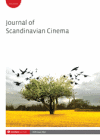
Journal of Scandinavian Cinema
Engaging with the Political and Artistic Dimensions of FilmThe Journal of Scandinavian Cinema, established in 2014 and published by INTELLECT LTD, serves as a premier platform dedicated to the interdisciplinary field of film studies with a specific focus on Scandinavian cinema. With an impressive Q2 category ranking in Visual Arts and Performing Arts for 2023, and a Scopus rank placing it in the top 62nd percentile of its category, this journal is instrumental in advancing scholarly dialogue within the arts community. The journal strives to explore and critique cinematic expressions from the Nordic countries, contributing to a nuanced understanding of cultural narratives and filmic innovations. Committed to fostering accessibility and engagement, it caters to a diverse audience including researchers, professionals, and students keen to delve into the artistic, cultural, and political dimensions of cinema. The Journal of Scandinavian Cinema is essential for anyone interested in the evolution and impact of film in the Scandinavian context, promising rich insights and a robust collection of scholarly articles.